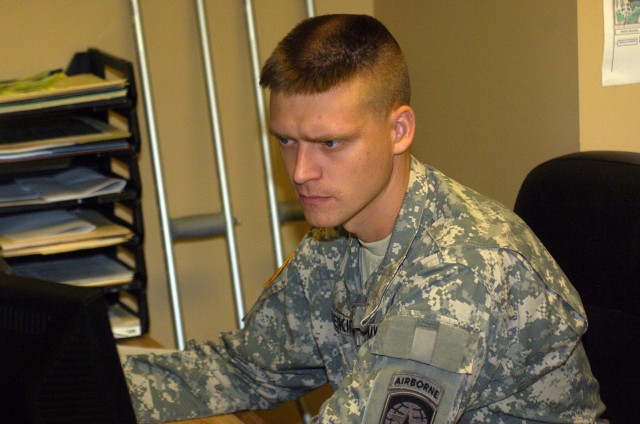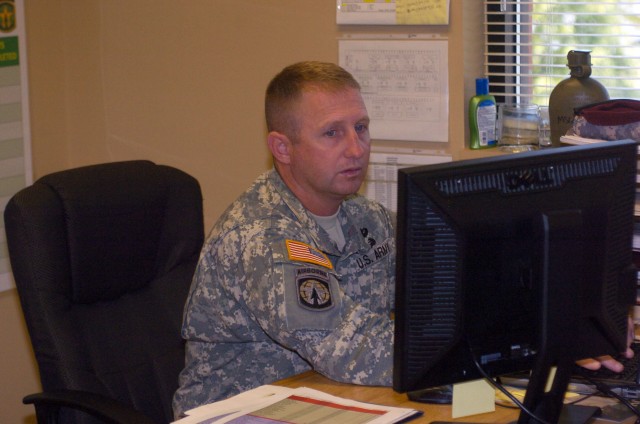FORT BRAGG, N.C. - As an Army noncommissioned officer, it's common and necessary to build a working relationship with your peers to ensure that business runs smoothly.
However, it's seldom that you'll find a duo whose commitment to the unit runs so deep that you seldom see one without the other close by.
That's the case for two senior NCOs in the 108th Military Police Company, 16th MP Brigade., where Master Sgts. Ronald Thornton and Charles Neikirk have forged a seamless relationship that ensures the 108th MP Co. operates at its highest level.
Thornton, a native of Waycross, Ga. and Neikirk, who hails from West Salem, Ill., both run the operations section in the unit. Because of their efforts and the team of NCOs around them, the 108th is one of the brigade's most efficient units.
"He's got his lane and I have my lane," explained Thornton, a 19-year veteran. "Pretty much, we have to talk to each other each day so that we're following each other's paths."
Thornton is the Operations NCO in charge of current operations or anything that deals with daily operations or operations that may occur within the upcoming weeks.
"I do all the taskings and anything that comes from the battalion that deals with taskings. I also deal with any kind of law enforcement request or training that will be coming up. I also kind of help him. I'm the oversight and he does ammo and everyday operations inside the company."
Thornton pointed out that he and Neikirk normally "tag-team" to ensure that the company fills all of its tasking obligations, while ensuring that it fulfills its requirement of four jumps per month.
"I oversee a sergeant first class that deals with any schools for the entire company and any training that we do or any (temporary duty) requests," Neikirk said. "I manage leave trackers or anything that is pretty much 30 days out or more."
He explained that the unit has just completed its task of patrolling the roads on and around Fort Bragg. It is a duty that they have performed for the past seven months as one of the few MP companies on post. The unit redeployed 10 months ago before picking up the on-post requirement.
"With the unit resetting since August and now possibly getting ready to deploy in the spring, we've been pretty busy," Neikirk said.
According to Thornton, his battalion only has two MP companies on Fort Bragg at one time, as others are serving in a deployed capacity in support of the war on terror.
"Of the two that are here, one is working law enforcement for the installation and the other is getting ready to enter its amber cycle and into the blue cycle to get ready to go back down range," he explained. "That's the way it's been for the last seven years."
He said the rotation continues as the next MP unit that re-deploys will replace their unit in performing on-post duties and taskings.
Both Neikirk and Thornton have been at Fort Bragg nearly three years and both have served as Army drill sergeants.
They said it is their training as cadre that has helped them to become successful operations NCOs.
"Time management," said both NCOs when asked which skill attained on the trail has been the biggest asset here at Fort Bragg.
"One thing that I did learn on the trail that helped me, not only as an operations NCO, but also as a platoon sergeant when I came here was managing Soldiers," Thornton said.
"You learn so much when dealing with 60 individuals, in that environment especially," Neikirk explained. "You control everything, from wake up to bedtime, but the bottom line is, you learn to organize 18 hours worth of training paperwork and problem-solving or leader issues more in a day on the trail than you would in a year as a squad leader.
"It's the mass amount of training hours to problem-solving, to counseling to leadership issues," he continued. "I always tell the Soldiers, your worst year as a squad leader will never compare to your best week as a drill sergeant. So learning how to handle that really helps."
Neikirk admitted that they both are workaholics, but at the end of the day, their work is complete.
"We're usually the first two here in the morning and the last two to leave at night," he said. "On an average day, we handle three to four different taskings or issues going on. The ability to keep the company flowing and still maintain your mandatory stuff that sits in the wings is quite impressive. It has been a good pairing for us."
Thornton agreed.
"It has been a really good pairing for the both of us," he said. "I came from down range as a operations sergeant. I was a platoon sergeant, but became an operations sergeant for three months before we redeployed and got back and transitioned into our reset."
He added that Neikirk came in and the other Soldier who was the operations sergeant became the unit's first sergeant.
"Ever since then, we kind of clicked," Thornton said. "We balance each other out on everything. It's sort of hard to put into words, but we just do it and we don't let anything fall off the plate. We keep everything moving in the right direction."




Social Sharing